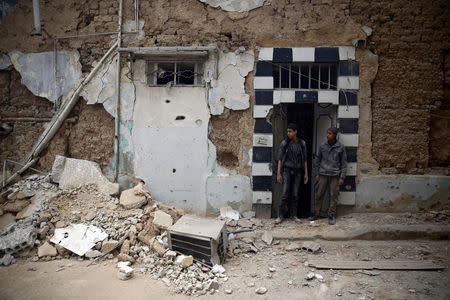EU tries to breathe life back into U.N. Syria talks

By Gabriela Baczynska SOFIA (Reuters) - The European Union on Thursday called for a swift restart of the stalled United Nations peace talks for Syria, worried by Russia's efforts to tighten the grip on power of its ally, President Bashar al-Assad. The U.N. talks in Geneva have made little progress during seven years of the war, struggling to even bring Assad's envoys and the Western-backed opposition into one room and reaching deadlock in December. Moscow has been promoting alternative talks in Astana with Turkey, which also supports rebel groups in Syria's multi-faceted civil war. Armed interventions by Russia and Iran have allowed Assad to recapture large parts of Syria but the U.N. says February has seen some of the worst fighting since violence erupted in March 2011. EU foreign ministers in Bulgaria were holding their first full discussion about Syria in almost a year on Thursday. "We'll discuss how to mobilize humanitarian support but also how to use the convening power of the European Union to support the U.N.-led political process that is facing difficult moments in these weeks," said EU's top diplomat, Federica Mogherini. Mogherini will host an international conference on Syria in Brussels in April to support the ailing peace process and seek more pledges of humanitarian aid. A previous such event in 2017 was overshadowed by a chemical attack in Syria. France said this week it would strike against Assad if his government carried out new attacks with chemical arms. Several EU ministers told reporters on the sidelines of Thursday's meeting that the U.N. should deal with such instances. AID The conflict shows no signs of abating as powers in the region and beyond back rival forces in the proxy war. Now entering its eighth year, it has killed hundreds of thousands and driven millions from their homes. "The tragedy continues," French Foreign Minister Jean-Yves Le Drian told reporters. "It is important for the Geneva process to restart as quickly as possible." The EU has so far played only a marginal role in efforts to resolve the conflict. It is trying to leverage its status as the world's largest aid donor to gain sway and has said it will not pay to help rebuild Syria if Moscow and Damascus crush Assad's opponents and ensure he holds on to power. Assad's forces have recently bombarded two of the last major rebel areas in Syria. Dire humanitarian conditions in the besieged areas of Eastern Ghouta and the northwestern province of Idlib have prompted the U.N. Security Council to hold discussions this month on a month-long ceasefire to allow aid deliveries and the evacuation of sick and wounded. "We always call for an increase in humanitarian aid for Syrians," Mazen Darwish, a Syrian lawyer and campaigner, told Reuters after addressing EU diplomats in Brussels earlier this month. "But we warn against using reconstruction money as a weapon. We want the reconstruction money to serve ethical goals, not be a weapon for the regime." (Additional reporting by Robert-Jan Bartunek, Alissa de Carbonnel and Peter Maushagen; writing by Gabriela Baczynska; editing by Andrew Roche)

